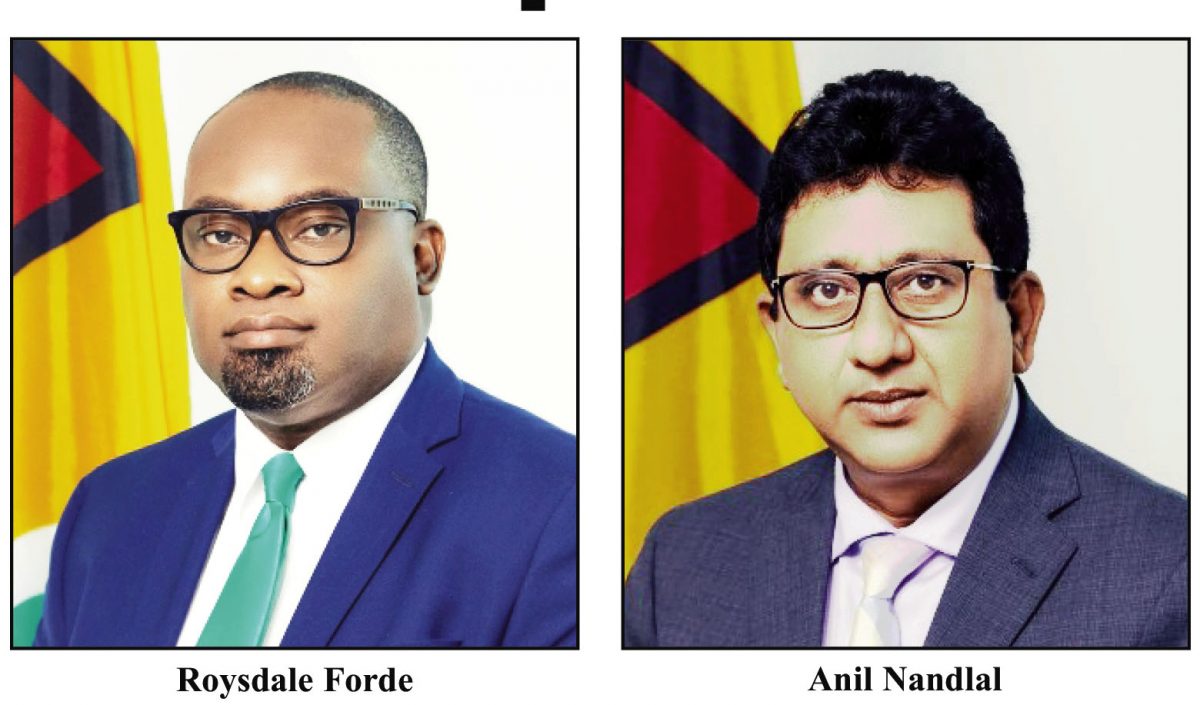Following an undertaking given by the Attorney General (AG) Anil Nandlall SC, Opposition Leader Aubrey Norton is now under no obligation to respond to President Irfaan Ali’s request for consultation regarding the appointment of Clifton Hicken who is currently acting as Commissioner of Police.
The undertaking was given by Nandlall SC when Norton’s application for an order staying any process of meaningful consultation came up for hearing yesterday before acting Chief Justice Roxane George SC.
Via a July 7, 2022 correspondence, Ali requested Norton to respond no later than next Tuesday, July 19, on the appointment of a person to act in the Office of Commissioner of Police pursuant to Article 211 (2) of the Constitution.
The request appeared baffling as the President had already appointed Hicken to act on March 30.
Nandlall and Norton’s attorney, Roysdale Forde SC, bickered over the grant of the stay.
Forde’s contention, among other things, was that his client should be granted the stay he was seeking, since there is a pending litigation before the court challenging Hicken’s very appointment.
Further, he referenced Norton’s request seeking answers from Ali about the constitutional basis for his appointment of Hicken as the acting Police Commissioner, which the Opposition Leader maintains was done in violation of the Constitution.
Forde, who also referred to Norton’s application which is asking the Court to define what constitutes “meaningful consultation,” submitted that his client could not then engage in any consultation with the President.
He argued that what is proper is to await a determination by the Court on the issues laid before it, before any consultation can be held.
Nandlall, however, strongly objected to the grant of a stay, arguing that there was no need for one.
To the Chief Justice’s assessment of the July 19th date referenced in the President’s letter as being a deadline, the AG said it was not, but a mere time period by when the President would have expressed his desire for Norton to respond.
Nandlall said that the date was being made out to be as if “something would happen” if the Opposition Leader did not respond by then.
“But not at all. If he responds, he responds; if he doesn’t, he doesn’t,” the AG argued.
Clearly not persuaded by the AG’s reasoning, however, the Chief Justice then proceeded to impose a stay, prohibiting both the President and Opposition Leader from moving forward with any consultation.
Just before the hearing concluded, however, Nandlall would eventually agree with the position which had been expressed by the Chief Justice to ensure that relations between the parties move no further until the Court makes a ruling.
It was at this point that the AG gave the undertaking that the Opposition Leader can hold any response to the letter sent by the President.
The Court then made it clear, and Nandlall agreed, that as of July 7, when the last correspondence was sent from the President, there is to be none other, and that Norton also does not have to respond.
The Chief Justice then recalled her previous stay-order but emphasized that
nothing further is to be done between the President and the Opposition Leader until the substantive matter is fully heard and determined.
Justice George has set August 8 for arguments on the fixed date application (FDA) filed by Norton, who is challenging the appointment of Patrick Findlay as Chairman of the Police Service Commission (PSC).
The notice of application in which Norton applied for the stay on consulting with the President, also included a similar application regarding Findlay’s appointment and the appointment of members of the Integrity Commission.
The Court, however, only dealt with the application regarding Hicken yesterday, but the Chief Justice has said that the substantive application will be dispensed with swiftly, given the public importance of all the connected matters before her.
While she not yet set a date, she indicated her intention to deliver her ruling in about two weeks following August 8.
Guyana’s Constitution states that the President can appoint a Commissioner of Police and Deputy Commissioners of Police only after consulting with the Opposition Leader and Chairperson of the PSC after the Chairperson has consulted with the other members of the Commission.
Government officials had said that Ali had employed the Doctrine of Necessity in naming Hicken as the position had become vacant with the retirement of Nigel Hoppie.
In May, APNU+AFC Chief Whip Christopher Jones moved to court to challenge Hicken’s appointment.
In his FDA, Jones contends that the invocation of the Doctrine of Necessity for the appointment was unreasonable and ultra vires. He also contends that the appointment violates Article 211(1) and 211(2) of the Constitution.
His matter is currently pending before the Chief Justice.
Meanwhile, Norton filed an action challenging Findlay’s appointment, arguing that it was “illegal, null, void and of no legal effect” and wants the Court to so declare.
His main contention is that President Irfaan Ali did not “meaningfully consult” him before appointing a chairman for the Commission as is required by Article 210 (1) (a) of the Constitution.
Norton wants the Court to declare what he calls the President’s “termination of the consultation process,” as being “arbitrary, unreasonable and unconstitutional.”






